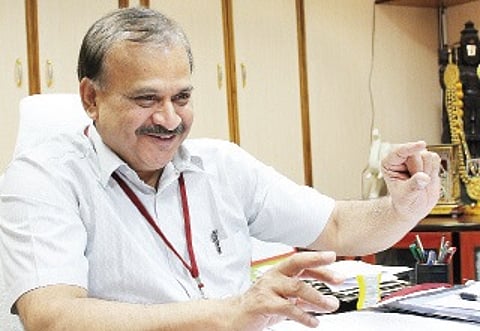

TIRUPATI: He has served 36 eventful years in the US in various capacities. Then he moved to the Jawaharlal Institute of Postgraduate Medical Education and Research (JIPMER), Puducherry as its director and CEO. Now, Dr TS Ravikumar has taken charge as the Director and Vice-Chancellor of the prestigious Tirumala Tirupati Devasthanams (TTD)-run Sri Venkateswara Institute of Medical Sciences (SVIMS) in Tirupati. An international authority on colo-rectal cancer and liver metastasis, Dr Kumar is a recipient of numerous awards and honours. He has been consistently on the listings of top doctors/best doctors since 1995. He is a member of several surgical and oncological societies, including the Society of University Surgeons and the American Surgical Association.
In an exclusive interview with TNIE, Dr TS Ravikumar has unveiled his plans for making SVIMS an institute of global repute. He expressed his gratitude to the government and the TTD for giving him the opportunity to serve SVIMS and the public at large. Excerpts of the interview.
What was your idea of SVIMS when you took over as its Director-cum-Vice Chancellor?
I made a visit to SVIMS before taking over. It was like a secret shopper examining how things are. I found that the ambience was similar to that of JIPMER, Pondicherry. I found that the staff, including doctors, nurses working in SVIMS, were very committed. I went round the hospital and found the interiors to be relatively clean and hygienic. But the area outside had lot of garbage, with people resorting to open defecation. It was then that I decided to make this Institution a centre of excellence both in terms of service delivery and efficiency. I found that the emergency wards are crowded and there were long queues at the OP ward. There are crowds in the corridors too.
What are your priorities after taking charge at SVIMS?
After taking charge, my foremost priority was to clean up the campus and to provide safe drinking water and toilets both inside and on the premises of the hospital. Improving the efficiency of care-takers in the emergency room and streamlining the systems to clear the crowds are my immediate priorities.
What are the steps being initiated to improve the medicare at SVIMS?
Obviously, I had no idea about the operation theatres and the staff strength here before I came here. Later, I also noticed that there are some funding issues, despite the TTD and the government fully backing the institution. There should be continuous funding to ensure development and sustainability of the institution. If you want to innovate and improve academic standards, you need to bring more resources. This is my biggest challenge. I already wrote to CEOs of 500 corporate companies to help in taking quality medicare to the downtrodden sections of the society. I am hoping for a positive response.
What are the new services that you want to introduce in SVIMS?
I am planning to create 10 institutions within SVIMS such as Institute of Excellence, Cardiac, Emergency trauma, Neurosciences, Renal sciences etc. These institutes will provide the highest level of excellence for specific diseases, besides conducting research. These institutes would also develop quality educational programmes. The second priority is to improve the staff efficiency to ensure seamless care for every patient. The third is to improve the quality of services. For this, I have started the SVIMS Quality Council to drive the quality at the grassroot level. Creating a quality cell isn’t enough. It needs to be monitored closely on a day-to-day basis. The council has representatives from each department.
What steps are being taken to ensure hassle-free treatment of emergency cases?
We have formed Triage system at the emergency room. This is impor tant because we need to make sure that the gravity of the situation and the extent of the treatment are properly understood. We have implemented a Five Point System. This is internationally accepted and is based on Emergency Severity Index (ESI). When a patient comes for treatment, the doctors go through the Triage system and decide about treatment regime. The patient will be grouped according to Triage points ranging from one to five. If the patient needs emergency medicare, he will be deemed as belonging to Group 1. The Group II will include patients needing expert opinon, which would be provided in 15 minutes. The Group III includes patients who would be examined within an hour or two. During this time, the tests are conducted and the reports would be scanned. Group IV and V are of a lower emergency level. This system will ensure medicare through multiple channels and avoids treatment delays. Using this triage, we can prevent errors in patient care and help save lives.
What are your future plans for SVIMS?
We are planning to establish a national-level Cancer Centre in SVIMS, where medical, radiation and surgical protocols would be developed. For this, I am getting affiliations from overseas.